The Book of Whys
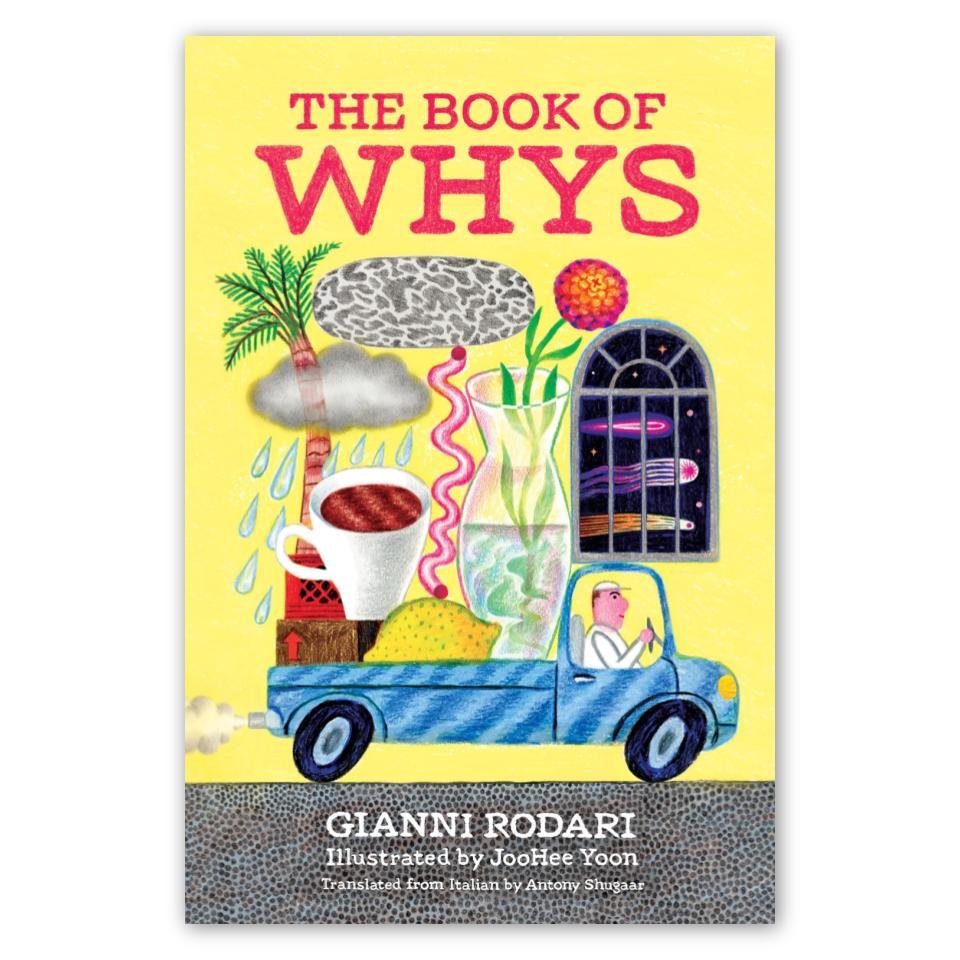
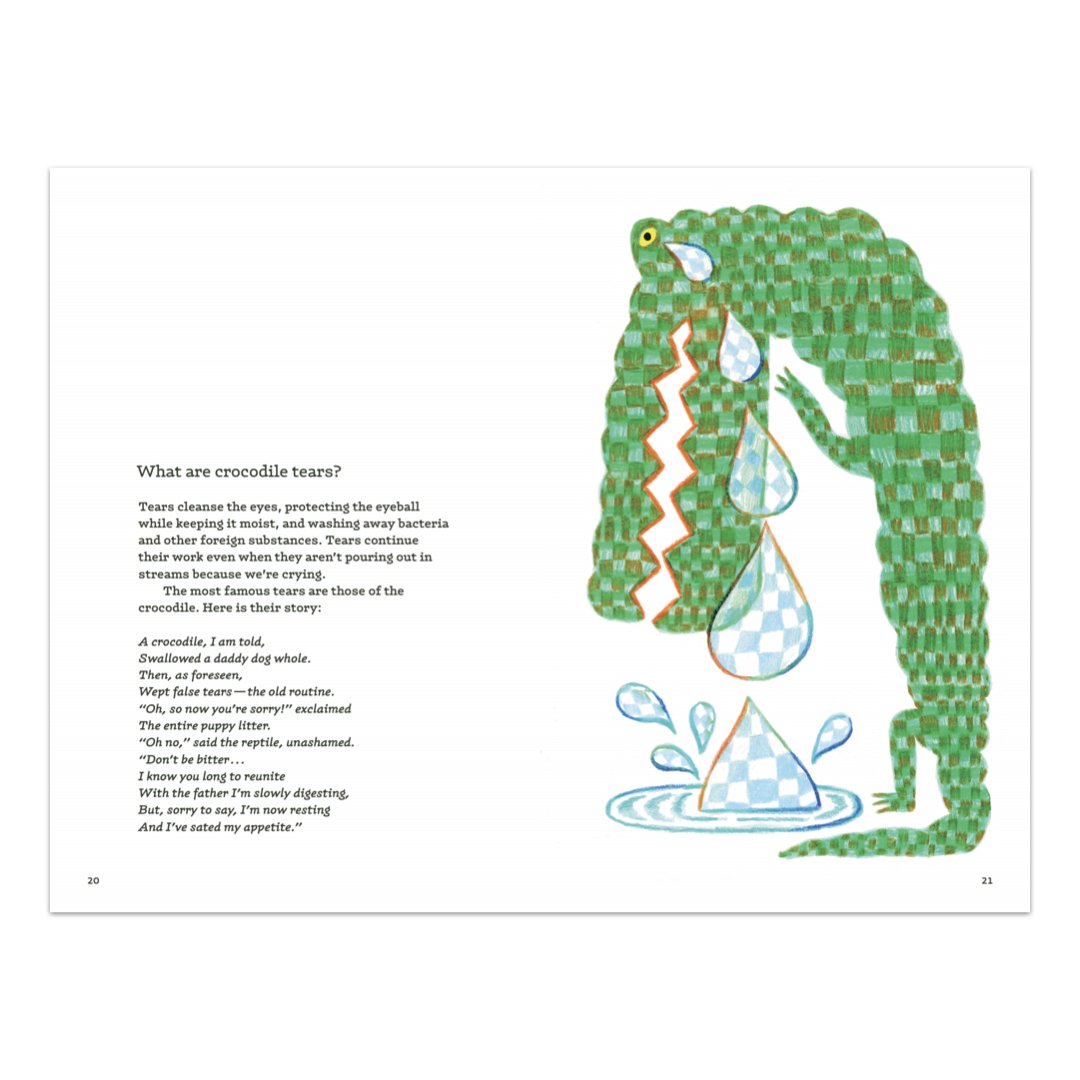
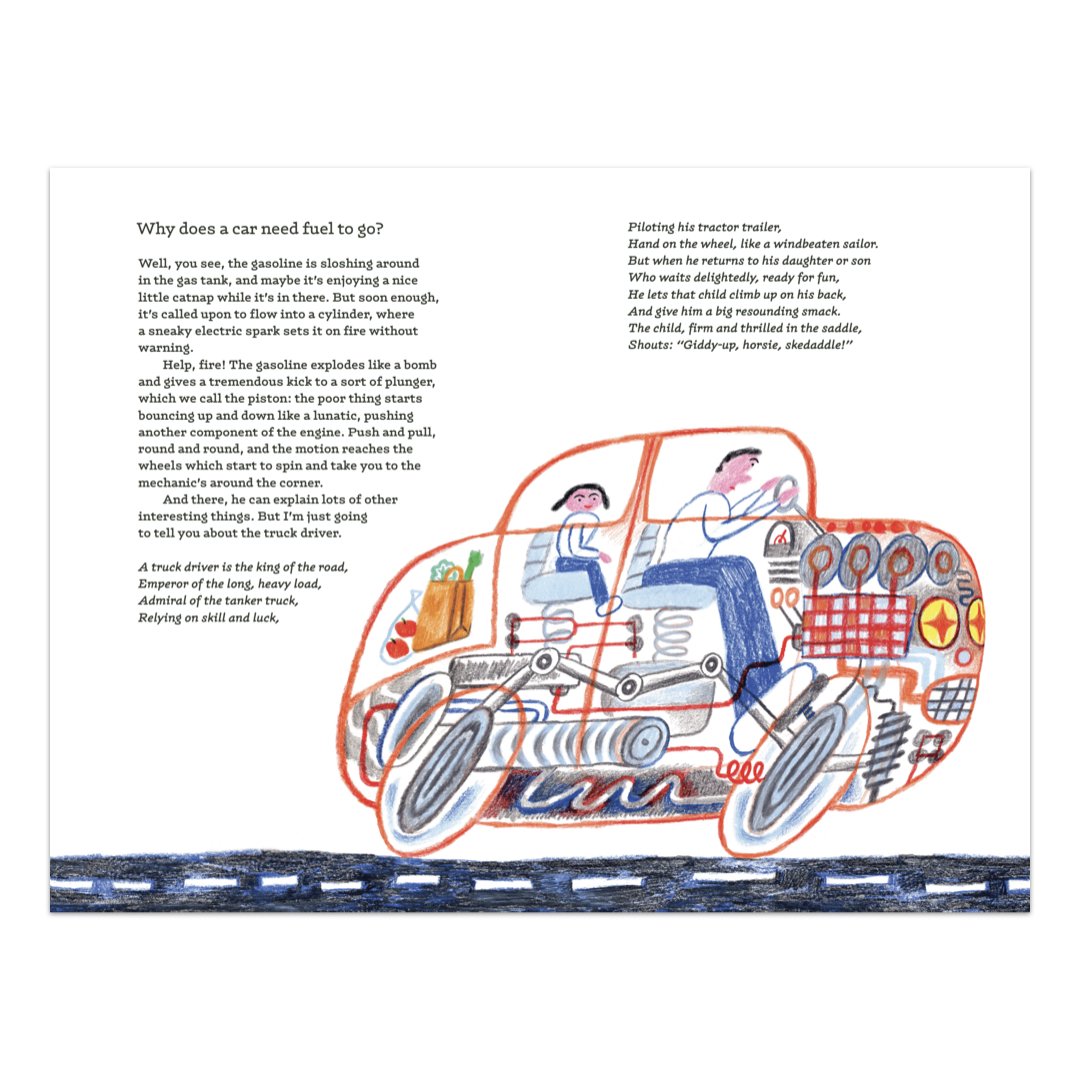
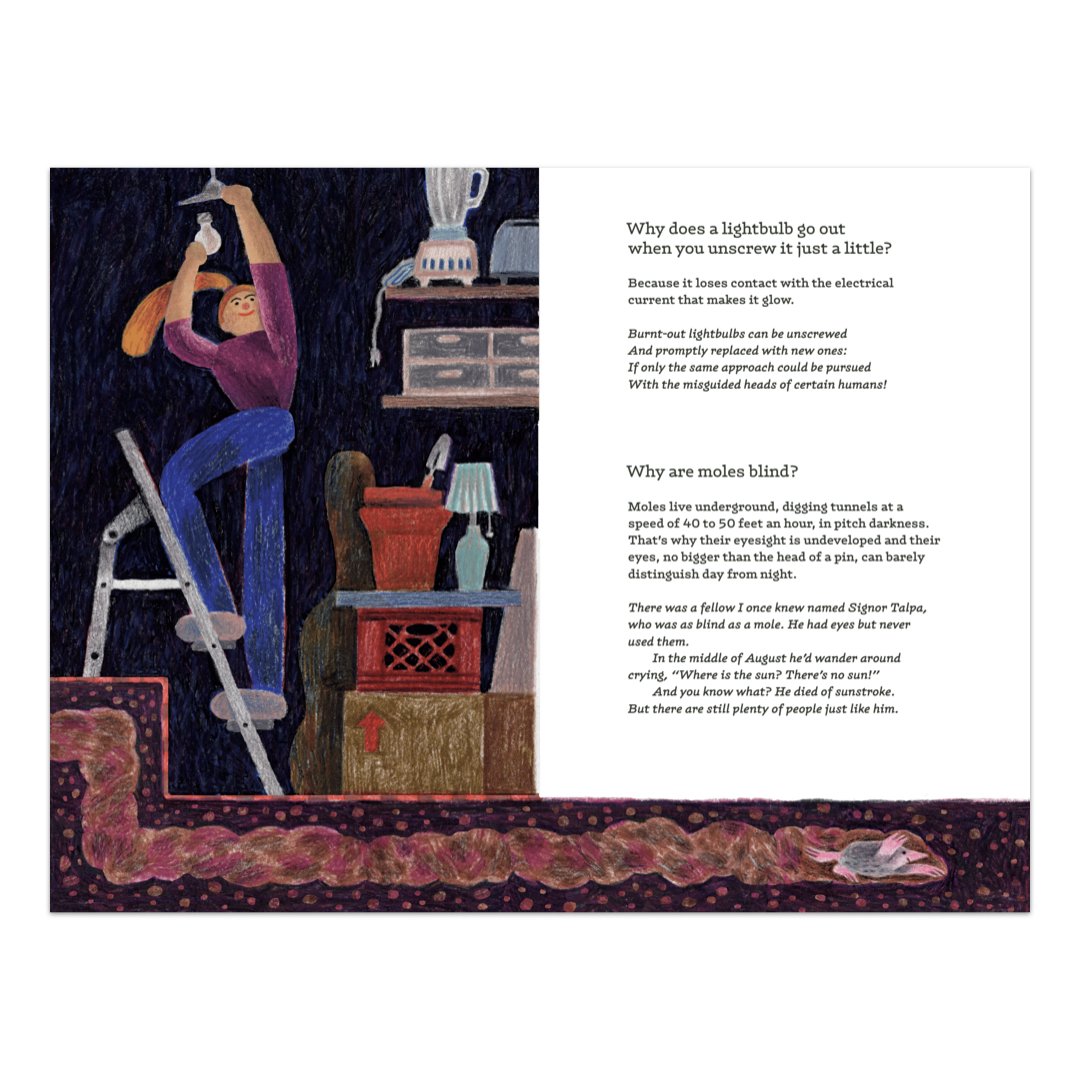
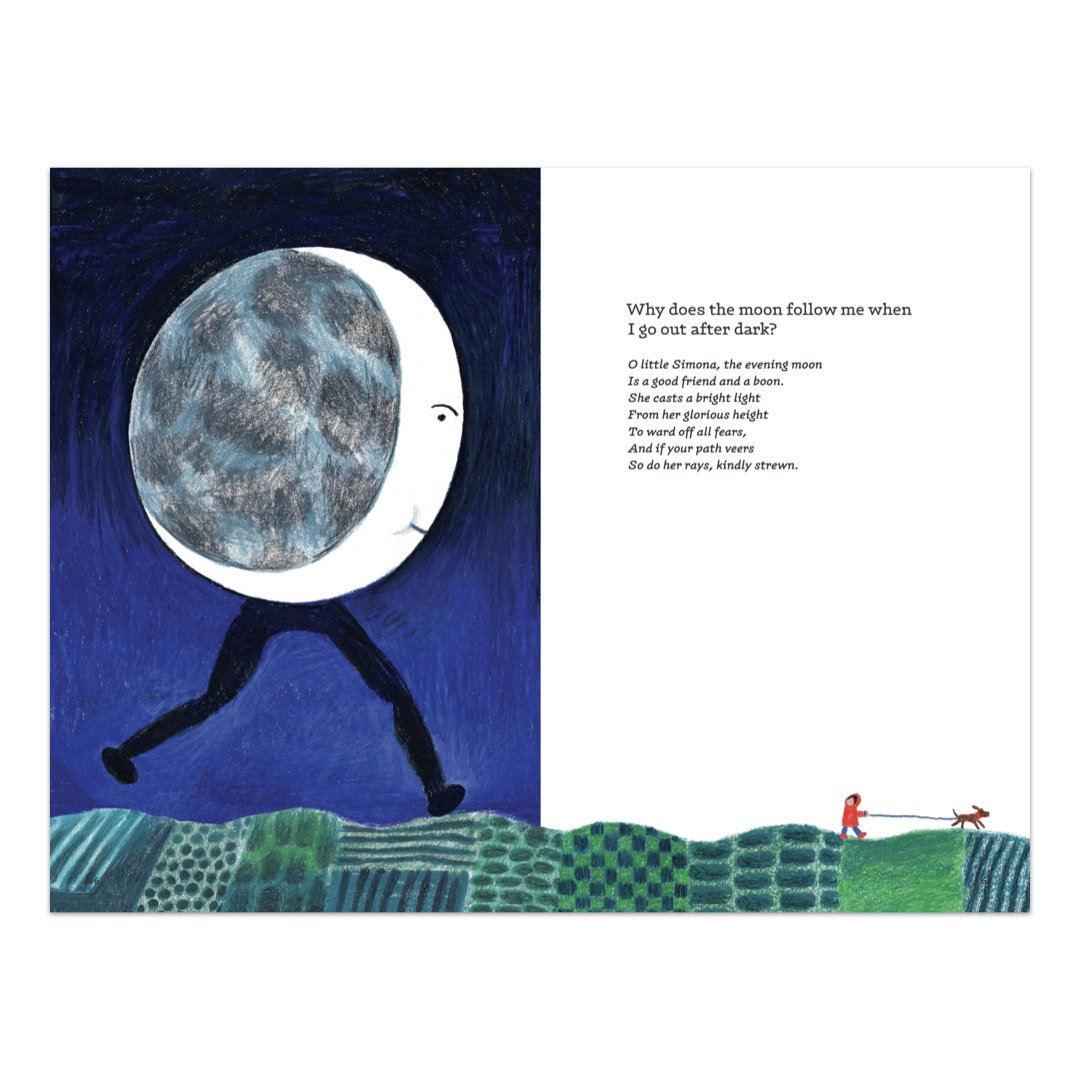
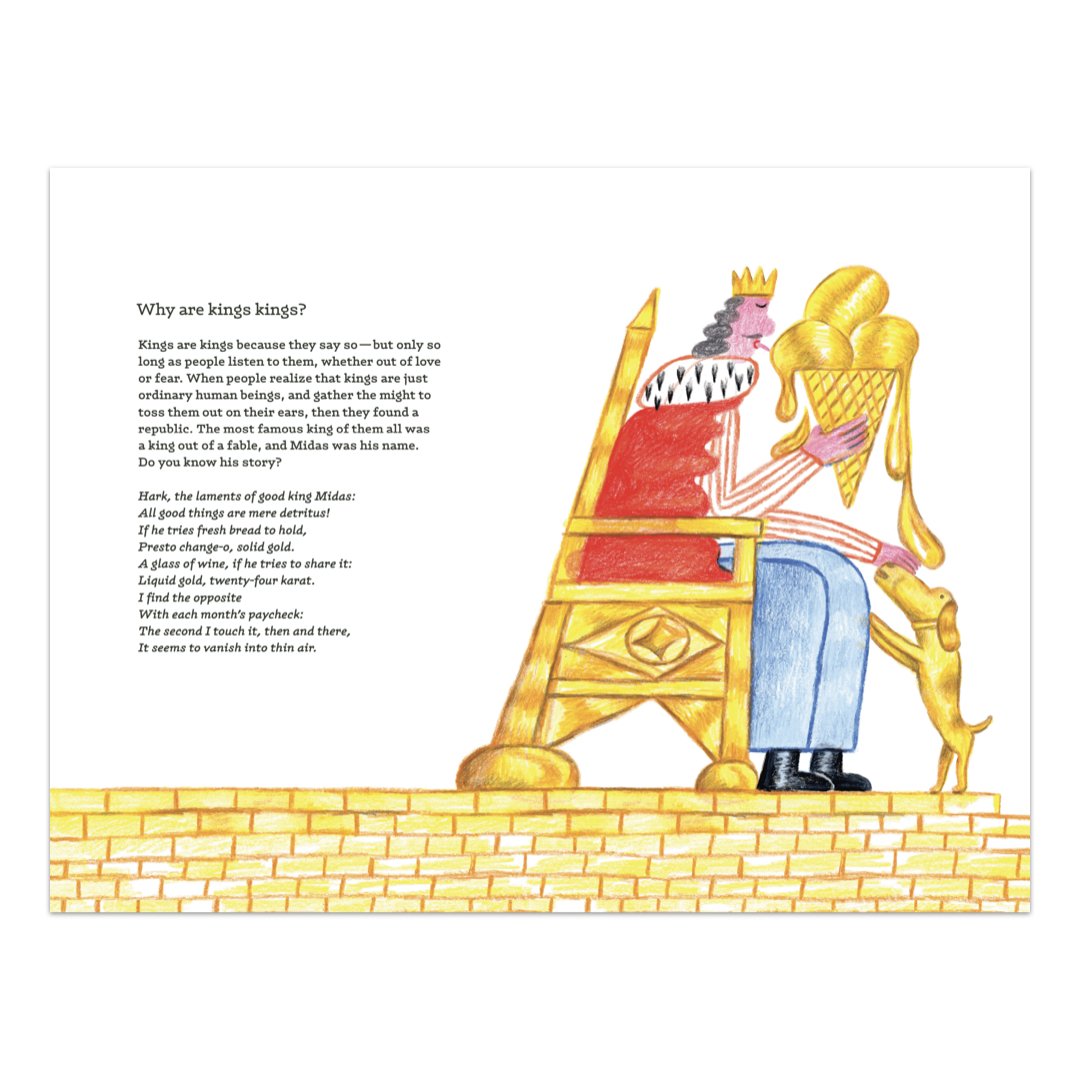
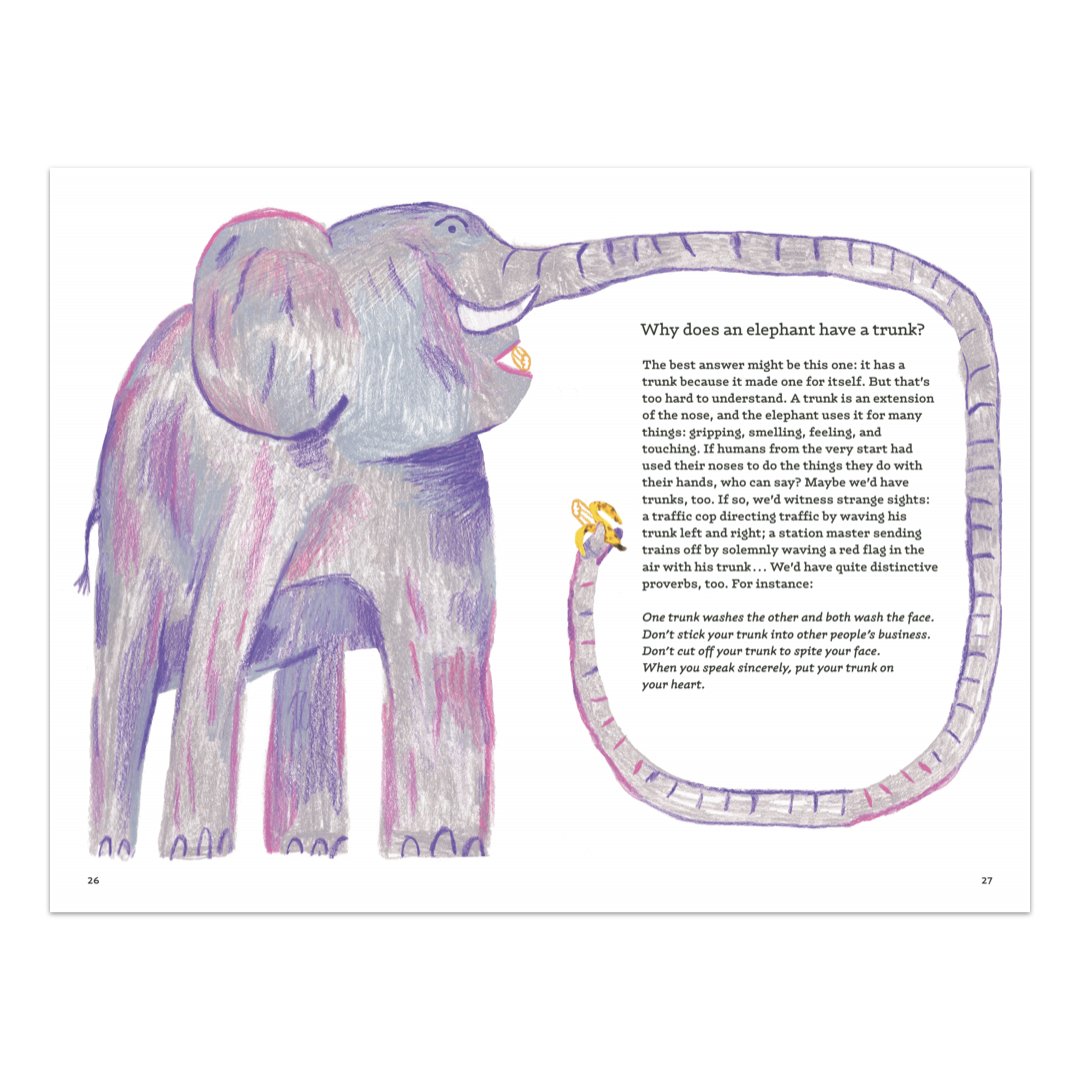
The Book of Whys
By Gianni Rodari
Illustrated by JooHee Yoon
Translated from Italian by Antony Shugaar
Factual as well as whimsical, and humorously illustrated, this is the first English-language publication of the answers given by one of Italy's greatest and most beloved children's authors to children's questions about animals, nature, technology, and culture.
Winner of the 2023 Italian Ministry of Foreign Affairs’s English Translation Prize!
Gianni Rodari is widely regarded as the father of modern Italian children's literature. A firm believer in the great intelligence of children, he worked both as a teacher and a journalist. For a number of years, children across Italy sent their questions to his weekly newspaper column—questions Rodari answered, most inventively, with rhymes and little poems. Why didn't he reply with facts alone? Because he wanted to provoke children into thinking about questions, norms, and language itself. The Book of Whys collects a selection of these questions—from "Why does an elephant have a trunk?" to "Why does a car need fuel?" to "Why are we born?"—along with Rodari's answers, which beautifully serve to highlight the complexities, simplicities, and absurdities of our world.
With a fresh translation from Antony Shugaar, who also translated Rodari's Telephone Tales (the 2021 Batchelder Award winner), and playful illustrations in colored pencils from artist JooHee Yoon (Beastly Verse; The Tiger Who Would Be King, a New York Times Best Illustrated Book of 2015; Inside Out and Upside Down), The Book of Whys is a playful, surprising, and poetically informative book for all those who are curious about the world and ready to play with the ways things are.
ISBN: 978-1-59270-364-7
6.4" (W) x 9.6" (H) • 156 pages • HCJ
REVIEWS
Winner of the 2023 Italian Ministry of Foreign Affairs’s English Translation Prize!
A Children's Book Council January 2023 Hot Off the Press selection!
One of Betsy Bird’s Top 4 Translations for Older Readers of 2024! “Rodari is a big name in the Italian children’s book scene… This particular book is a series of questions from kids that he would answer in his newspaper column. But the true star of this show is Antony Shugaar who has the impossible task of having to not only translate into rhyme for many of these poems, but to make the jokes work (even the puns!), too… Well done, sir!!” —Betsy Bird, A Fuse #8 Production (A School LIbrary Journal blog)
“This witty, irreverent poetry collection grew out of Rodari's 1950s newspaper-column responses to Italian children who took him up on his offer: ‘Everything has a reason why: just ask me and I'll reply.’” —New York Times
“Rodari (1920-80), his country’s most celebrated 20th-century writer for children, took questions sent in by young readers over the course of several years to l’Unità, the newspaper of the Italian Communist Party. A selection of these entries, smoothly translated by Antony Shugaar and illustrated with zest and humor by JooHee Yoon, appears in The Book of Whys, a beguiling volume suited for sampling rather than for reading straight through… Rodari tackles all these questions with respect for the innocence and curiosity of his unseen interlocutors but without pandering or (mostly) showing his politics… His answers usually had two parts: one chatty and factual, the other jocose and poetic. Addressing the question of why river water is murky, Rodari writes that ‘as rivers descend from mountains, … they load themselves up with mud and debris, which they release into the sea.’ To accompany this very sensible explanation, he offers a ditty about all the famous rivers (the Thames, the Tiber, the Indus and others) meeting in the middle, as it were, and becoming subsumed and anonymous as their waters ‘swirl waves of brine.’” —Wall Street Journal
“A wild amalgamation of poetry, philosophy, science, and stellar art, this is a book just as eclectic, wild, and whimsical as its creator. It’s honestly not like anything out there… The unsung hero of this story is, in fact, translator Antony Shugaar… Shugaar is as good as he is at not simply translating a poem but getting it to rhyme AND be funny in the same way it would be funny in Italian… Shugaar is as adept as maintaining rhyme and meter as he is inserting words like ‘coinkydink’ into a line… Yoon’s art serves as a rather perfect accompaniment… I get the feeling that she’s having fun experimenting. One moment she might be shading hyper-realistic eggs on a page. The next, it’s wordless two page spreads that simply show an older sister and younger brother entering a forest of towering trees… Unabashedly, unapologetically Italian, lacking in any easily-slotted categories, and filled with funny, sometimes brilliant, translations and poems, The Book of Whys is an oddity. In a sea of samey samey children’s books, it sticks out like a sore thumb. That isn’t a criticism… A strangely moving, beautifully illustrated, odd as heck little book.“ —Betsy Bird, A Fuse 8 Production (A School Library Journal blog)
“Translated questions from kids, answered by renowned Italian children’s writer Rodari in his 1950s newspaper columns… His ethos shines through in this work; respect for his child audience mingles with his pro-labor, anti-authoritarian outlook. He often appends mini-parables and rhyming ditties to his answers. Throughout, Rodari excoriates proverbs for their fusty, contradictory didacticism… Rodari provides pithy answers to basic queries about rainbows, light bulbs, and auto engines… His riff on the secret to lifelong happiness is lovely and affirmative: ‘You learn it from life.’ Depicting diverse children and adults, Yoon’s whimsical illustrations further enliven the text. Welcome insights from a celebrated author.” —Kirkus
“Based on columns that Rodari wrote for Italian daily newspaper l’Unità from 1955 to 1958 in which he addressed wide-ranging topics from young readers, this quixotic collection of poems provides comical answers for each query. Evergreen wonderings such as ‘Which came first, the chicken or the egg?’ and ‘Why do your eyes sting when you chop an onion?’ prompt playful yet scientific responses rendered in rhyme that paint witty stories infused with vivacious word play. Kindness radiates… The compassionate and educational replies are enhanced by midcentury-modern-style color pencil illustrations by Yoon, who depicts worshipped Egyptian cats, figures of varying skin tones engaging in myriad activities, and whimsy galore, making for a simultaneously thought-provoking and laugh-out-loud work that tackles questions regarding flights of fancy and contemporary existence.” —Publishers Weekly
“He [Rodari] has been compared to Lewis Carroll in regards to his style of using ‘logic and illogic’ to shape his responses. He aimed to help children make sense of their world. Each question and their answers are paired with Yoon’s beautiful illustrations, which are as charmingly eccentric as the answers. They are done in a fantastic colored pencil style, and vary from a small corner or page border to entire spreads.” —School Library Journal
TRANSLATOR INTERVIEW: A Conversation around Language, Hijacking Reality, and Italy with Translator Antony Shugaar
Antony Shugaar, the translator of Telephone Tales, discusses translation, Rodari, and children’s literature on our blog: part one, part two, part three.
AWARDS AND REVIEWS FOR TELEPHONE TALES
★ Winner of the 2021 Mildred A. Batchelder Award
★ Winner of the 2020 Italian Ministry of Foreign Affairs’s English Translation Prize
★ “At times whimsical, absurd, and subversive, the stories carry readers along roads made of chocolate, under skies that rain Jordan almonds, and into children’s private language. They also speak to today’s urgent concerns—human connection, the injustice of inequality, and the dangers of authoritarianism. At every turn, Rodari remains emphatically on the side of the young, reminding readers that ‘the whole world already belongs to every child that comes into it.... They need only to roll up their sleeves, stretch out their hands, and take it for themselves.’ Numerous gatefold spreads and tipped-in pages add to the rich texture of this beautifully produced volume.” —STARRED REVIEW, Publishers Weekly
“In honor of the centenary, this year, of Rodari’s birth, a small, enterprising publisher in Brooklyn, Enchanted Lion, has brought out the first full English-language edition of Telephone Tales, in a spirited translation by Antony Shugaar. Now, albeit decades late, Anglophone readers can find out why Italians love this writer…It would be hard for anyone, of any age, not to love the illustrations—mostly in Magic Marker—that Enchanted Lion commissioned for “Telephone Tales,” from the Italian artist Valerio Vidali. The book design itself harbors surprises. Some pages have extra little inner pages glued to them. Others are gatefold pages, where you pull the inner edge and another page folds out. In the drawings, you are shown entire worlds of semi-abstract figures: giant noses, a palace made of ice cream, birds eating cookies, plus, of course, kings and queens and a princess in a tower. The pages are sewn with stitches worthy of a Balenciaga gown. It is astonishing that the book costs only $27.95. Go buy one, right now." —The New Yorker
“67 whimsically surreal tales, most as short as the time one coin allotted — first published together in Italian in 1962 and finally all brought together again in a new English translation — make up this treasure trove of a book. Valerio Vidali’s new illustrations, inspired by the act of doodling on a message pad, match Rodari’s radical playfulness. Vibrant and fanciful, they run the gamut from small inserted flaps of paper to brightly colored foldout drawings. Rodari’s upside-down fairy-tale world, in which the table of contents is at the back, features, among other delights, a stoplight that turns blue; a city bus full of passengers that on a lark heads off its route into a meadow; a country that boasts pencil unsharpeners, clothes unhangers and military uncannons (“good for unwaging war”); and an entirely edible planet that offers this for breakfast: “The alarm clock goes off, you wake up, you grab the alarm clock, and you gobble it down in two bites.” —The New York Times
“The book itself is a thing of beauty, with tantalizing, full-colour illustrations by Valerio Vidali over double-page, fold-out spreads. Antony Shugaar devises parallels to Rodari’s exuberantly inventive language and finds an equivalent to the rhythms of his prose. For readers of all ages, this book is like education on planet Blih, where, we are told, “knowledge is sold in bottles, in drinkable form. History is a red liquid that resembles Grenadine, geography is a minty green drink”, and the sheer delight of storytelling flows in abundance.” —Times Literary Supplement
“Offbeat tales for readers in the mood for something whimsically contemplative.” —Kirkus
"There are a lot of stories to love in this Italian export. Rodari is a master storyteller; his imagination knows no bounds from runaway noses, buildings made of ice cream, magical carousels, and an elevator to the stars. Each story is thoughtful and well constructed as Rodari plays delightfully with different themes." —School Library Journal
"Gianni Rodari is considered the most innovative Italian children's writer of the 20th century. His countless stories and rhymes tend to end well, but in the teeth of evidence. Telephone Tales offers 68 of them ably translated by Antony Shugaar with illustrations by Valerio Vidali... For Rodari, the children's story is always an act of generosity which favors a process of initiation and liberation." —The London Review of Books
“The stories range in tone from the fanciful to the absurd to the philosophical. What they have in common is brevity—Bianchi ‘couldn’t afford to make extended long-distance phone calls’—and a subversive quality that would seem to reflect the author’s communist leanings ... All sorts of imaginative leaps take place in this handsome book.” —Wall Street Journal
